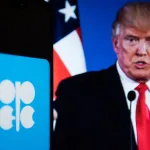Saudi Arabia has issued a serious warning to its fellow members of the Organisation of the Petroleum Exporting Countries (OPEC) and its allies, commonly known as OPEC+.
The Kingdom warned that oil prices could fall as low as $50 per barrel if member nations fail to comply with agreed-upon production cuts.
Join our WhatsApp ChannelThis warning comes from Saudi Energy Minister Abdulaziz bin Salman, highlighting the risks of non-compliance within the group.
In a conference call held last week with other OPEC+ ministers, Abdulaziz bin Salman emphasised that if countries continue to exceed their output quotas, the market could face a sharp drop in oil prices. “There is no point in adding more barrels if there isn’t room for them in the market,” one of the conference call delegates reported.
The Wall Street Journal, citing sources from OPEC, stated that the message from the Saudi minister was clear: countries flouting their commitments may force Saudi Arabia into a price war to defend its market share.
Strict Oil Production Cuts in Saudi Arabia
Saudi Arabia, the de facto leader of OPEC, has been rigorously adhering to its production cuts. Over the past year, the Kingdom has voluntarily withheld 1 million barrels per day (bpd) from the market in addition to its OPEC+ obligations. According to the plan, Saudi Arabia aims to keep its production around 9 million bpd, and so far, the country has been consistent in following this target.
READ ALSO: Nigeria, Saudi Arabia To Resume Cargo Flight Operations – Keyamo
However, some OPEC+ members, notably Iraq and Kazakhstan, have not complied with the agreed production cuts. Abdulaziz bin Salman reportedly singled out these two nations during last week’s conference call, pointing to Iraq, the second-largest producer in OPEC, and Kazakhstan, a non-OPEC member, as major overproducers.
Potential Price War
Saudi Arabia’s latest warning reflects growing frustration with quota cheaters. Some OPEC delegates interpreted this warning as a veiled threat of a price war, with their potentially willing to endure short-term losses to regain control over the oil market. The Financial Times recently reported that Saudi Arabia may even abandon its unofficial $100 per barrel oil price target to maintain its market share.
“We may see Saudi Arabia take drastic measures to stabilize the market if other producers do not fall in line,” said an industry insider. This could mean a return to tactics last seen in 2020 when Saudi Arabia and Russia engaged in a price war during the early months of the COVID-19 pandemic.
The Impact of Overproduction
Persistent overproduction from some OPEC+ members has kept oil prices from rising, even as demand remains below expectations. Non-OPEC member Russia has also lagged in compliance with the OPEC+ production agreement, adding further pressure on the market.
Abdulaziz bin Salman’s warning is seen as a last attempt to bring the OPEC+ coalition back into alignment. “Some better shut up and respect their commitments toward OPEC+,” was the blunt message from Saudi Arabia, according to a source who attended the meeting.
Saudi Arabia’s Strategy Moving Forward
Saudi Arabia has signalled its commitment to sticking with the current production cuts, even if it means facing short-term financial difficulties. The Kingdom’s willingness to endure short-term pain to maintain long-term market stability reflects its determination to lead OPEC+ through these challenging times.
For now, the future of global oil prices rests on whether other OPEC+ members, particularly Iraq, Kazakhstan, and Russia, follow through on their production cut promises. If they fail to do so, Saudi Arabia may take further steps to protect its interests, which could lead to significant changes in the global oil market.
Emmanuel Ochayi is a journalist. He is a graduate of the University of Lagos, School of first choice and the nations pride. Emmanuel is keen on exploring writing angles in different areas, including Business, climate change, politics, Education, and others.
- Emmanuel Ochayihttps://www.primebusiness.africa/author/ochayi/
- Emmanuel Ochayihttps://www.primebusiness.africa/author/ochayi/
- Emmanuel Ochayihttps://www.primebusiness.africa/author/ochayi/
- Emmanuel Ochayihttps://www.primebusiness.africa/author/ochayi/




















Follow Us